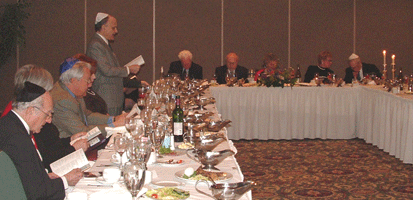
Tales of a 21st Century Gypsy
April 6, 2004. With family in Norfolk.
Iíve spent the past few days in Norfolk visiting relatives. I first met these relatives four years ago, after my dad happened upon his family tree on the web. He emailed it to my sister, she forwarded it to me, and I started talking to people. A few months later I made my first excursion south and met them.
Itís strange finding a huge family I didnít know about. My grandfather had five or six siblings, many of whom stayed in Norfolk after serving in the navy in World War I. My grandfather remained in New York, but he died before my
father was born, in the flu epidemic of 1918. His widow couldnít cope with three young children including an infant (my dad), and sent them to live with their Norfolk relatives while she pulled her life together. So my dadís cousins remember him from their earliest childhood, the infant who was raised with them for his first five or six years. My father had been enrolled in first grade in Norfolk when his mother brought her children back to New York. And there largely ended the connection. Some of my Norfolk relatives spoke of having met my mother once on a trip to New York, and I remember a trip we made to Norfolk when I was six and my uncle still lived there. But my dad lost touch with his cousins, and I didnít know they existed.
My dadís cousins, whom I refer to alternately as uncle, cousin, or just Robert, Leon, and Joseph (three brothers), and Norman (their first cousin), have been curious and welcoming. On my first visit I stayed with Norman, since then Iíve stayed with Robert; they decide where I will go, and present it to me as a fait accompli. They have treated me like a visiting dignitary, with dinners organized and visits and special efforts to introduce me to their children and grandchildren, whom I have trouble keeping track of.
I donít quite know what to make of this. I want to know them, because they are in some way a tie to my father, even though they hadnít seen him in almost half a century. But as individuals, rather than symbols of ďfamily,Ē I donít know them. I donít know whether weíd like each other as people if we spent more time together, rather than being ďinterestedĒ in each other because of the curiosity of the long-lost relative. Does that matter? I see my family on my motherís side, and Iím very happy to see them, and it doesnít matter that outside of ritual gatherings at Passover and Thanksgiving weíd never think of making the effort to see each other.
In obvious ways the Norfolk relatives are not like me or my family Ė my motherís family, that is. Family matters to them Ė that two generations went to the University of Virginia but one of the third generation didnít get in, that ďthe Hecht boysĒ (my fatherís cousins, all over eighty) were all in the navy, as were their fathers. Family gatherings are formal and dressy, held in hotels rather than in someoneís home. I came here for Passover, and joined their seder - I had to bring my best (only) party dress, worn only twice before, just to fit in. They are more religious than ďmyĒ family, and far more Zionist. And for the most part they are rich and have married rich. Some are in business or real estate, some are doctors. They have expectations of each other that the members of ďmyĒ family donít have.
Talking to Norman and Robert, Iíve gotten a better sense of where being Jewish fits in their lives, and why that differs from mine. Growing up in New York, I never went to school with a non-Jew until I was eleven. In high school I thought everyone was either Jewish, Catholic, or black. I didnít know what a WASP was until I got to college. Being Jewish was mundane and uninteresting, and I envied my ďethnicĒ friends who spoke Chinese and Hungarian at home.
The Hampton Roads area has fewer than twenty thousand Jews. Norman said that every day after school the bullies waited on the corner to beat him up, simply because he was Jewish. He was the only Jew, always the only Jew. In college Ė UVa, of course, like all the Norfolk Hechts of his generation - he joined the Jewish fraternity. Anti-semitism, which I have never seen close up, was a daily reality in their world. Being Jewish was never mundane, they stuck out like a sore thumb. In that world, they had to defend their Judaism, leaving it aside was no more possible than a black man could leave aside his skin color.
Robert reacts to my lack of interest in Judaism much as I react to girls who donít want to call themselves feminist. The girls donít realize the fight it took to get them the freedoms they take for granted. And I, having grown up in New York City in the 1960s and 1970s, donít realize what life could be like in a community where Jews are conspicuous instead of mundane. I donít see the need to watch out for the rights of ďmy peopleĒ because Iíve never seen them threatened.
Continue to the next entry. Return home.
Unless otherwise marked, all text and photos on this site ©Joy E. Hecht.